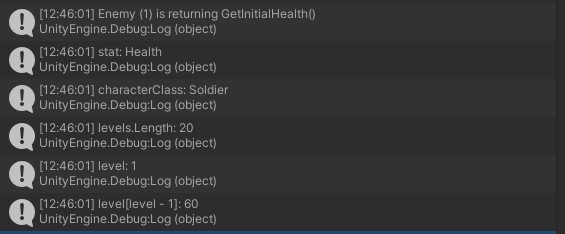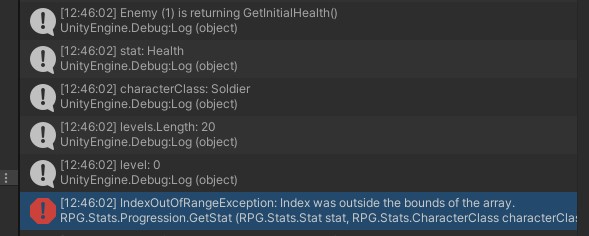My saving system is throwing a SerializationException on save and on load. I tried a bit of debug, but I’m afraid it’s beyond me.
On Save:
SerializationException: Type 'GameDevTV.Utils.LazyValue`1[[System.Single, mscorlib, Version=4.0.0.0, Culture=neutral, PublicKeyToken=b77a5c561934e089]]' in Assembly 'Assembly-CSharp, Version=0.0.0.0, Culture=neutral, PublicKeyToken=null' is not marked as serializable.
System.Runtime.Serialization.FormatterServices.InternalGetSerializableMembers (System.RuntimeType type) (at <eae584ce26bc40229c1b1aa476bfa589>:0)
System.Runtime.Serialization.FormatterServices+<>c__DisplayClass9_0.<GetSerializableMembers>b__0 (System.Runtime.Serialization.MemberHolder _) (at <eae584ce26bc40229c1b1aa476bfa589>:0)
System.Collections.Concurrent.ConcurrentDictionary`2[TKey,TValue].GetOrAdd (TKey key, System.Func`2[T,TResult] valueFactory) (at <eae584ce26bc40229c1b1aa476bfa589>:0)
System.Runtime.Serialization.FormatterServices.GetSerializableMembers (System.Type type, System.Runtime.Serialization.StreamingContext context) (at <eae584ce26bc40229c1b1aa476bfa589>:0)
System.Runtime.Serialization.Formatters.Binary.WriteObjectInfo.InitMemberInfo () (at <eae584ce26bc40229c1b1aa476bfa589>:0)
System.Runtime.Serialization.Formatters.Binary.WriteObjectInfo.InitSerialize (System.Object obj, System.Runtime.Serialization.ISurrogateSelector surrogateSelector, System.Runtime.Serialization.StreamingContext context, System.Runtime.Serialization.Formatters.Binary.SerObjectInfoInit serObjectInfoInit, System.Runtime.Serialization.IFormatterConverter converter, System.Runtime.Serialization.Formatters.Binary.ObjectWriter objectWriter, System.Runtime.Serialization.SerializationBinder binder) (at <eae584ce26bc40229c1b1aa476bfa589>:0)
System.Runtime.Serialization.Formatters.Binary.WriteObjectInfo.Serialize (System.Object obj, System.Runtime.Serialization.ISurrogateSelector surrogateSelector, System.Runtime.Serialization.StreamingContext context, System.Runtime.Serialization.Formatters.Binary.SerObjectInfoInit serObjectInfoInit, System.Runtime.Serialization.IFormatterConverter converter, System.Runtime.Serialization.Formatters.Binary.ObjectWriter objectWriter, System.Runtime.Serialization.SerializationBinder binder) (at <eae584ce26bc40229c1b1aa476bfa589>:0)
System.Runtime.Serialization.Formatters.Binary.ObjectWriter.Write (System.Runtime.Serialization.Formatters.Binary.WriteObjectInfo objectInfo, System.Runtime.Serialization.Formatters.Binary.NameInfo memberNameInfo, System.Runtime.Serialization.Formatters.Binary.NameInfo typeNameInfo) (at <eae584ce26bc40229c1b1aa476bfa589>:0)
System.Runtime.Serialization.Formatters.Binary.ObjectWriter.WriteArrayMember (System.Runtime.Serialization.Formatters.Binary.WriteObjectInfo objectInfo, System.Runtime.Serialization.Formatters.Binary.NameInfo arrayElemTypeNameInfo, System.Object data) (at <eae584ce26bc40229c1b1aa476bfa589>:0)
System.Runtime.Serialization.Formatters.Binary.ObjectWriter.WriteArray (System.Runtime.Serialization.Formatters.Binary.WriteObjectInfo objectInfo, System.Runtime.Serialization.Formatters.Binary.NameInfo memberNameInfo, System.Runtime.Serialization.Formatters.Binary.WriteObjectInfo memberObjectInfo) (at <eae584ce26bc40229c1b1aa476bfa589>:0)
System.Runtime.Serialization.Formatters.Binary.ObjectWriter.Write (System.Runtime.Serialization.Formatters.Binary.WriteObjectInfo objectInfo, System.Runtime.Serialization.Formatters.Binary.NameInfo memberNameInfo, System.Runtime.Serialization.Formatters.Binary.NameInfo typeNameInfo) (at <eae584ce26bc40229c1b1aa476bfa589>:0)
System.Runtime.Serialization.Formatters.Binary.ObjectWriter.Serialize (System.Object graph, System.Runtime.Remoting.Messaging.Header[] inHeaders, System.Runtime.Serialization.Formatters.Binary.__BinaryWriter serWriter, System.Boolean fCheck) (at <eae584ce26bc40229c1b1aa476bfa589>:0)
System.Runtime.Serialization.Formatters.Binary.BinaryFormatter.Serialize (System.IO.Stream serializationStream, System.Object graph, System.Runtime.Remoting.Messaging.Header[] headers, System.Boolean fCheck) (at <eae584ce26bc40229c1b1aa476bfa589>:0)
System.Runtime.Serialization.Formatters.Binary.BinaryFormatter.Serialize (System.IO.Stream serializationStream, System.Object graph, System.Runtime.Remoting.Messaging.Header[] headers) (at <eae584ce26bc40229c1b1aa476bfa589>:0)
System.Runtime.Serialization.Formatters.Binary.BinaryFormatter.Serialize (System.IO.Stream serializationStream, System.Object graph) (at <eae584ce26bc40229c1b1aa476bfa589>:0)
RPG.Saving.SavingSystem.SaveFile (System.String saveFile, System.Object state) (at Assets/Scripts/Saving/SavingSystem.cs:64)
RPG.Saving.SavingSystem.Save (System.String saveFile) (at Assets/Scripts/Saving/SavingSystem.cs:30)
RPG.SceneManagement.SavingWrapper.Save () (at Assets/Scripts/ScreenManagement/SavingWrapper.cs:57)
RPG.SceneManagement.SavingWrapper.Update () (at Assets/Scripts/ScreenManagement/SavingWrapper.cs:45)
On Load:
SerializationException: End of Stream encountered before parsing was completed.
System.Runtime.Serialization.Formatters.Binary.__BinaryParser.Run () (at <eae584ce26bc40229c1b1aa476bfa589>:0)
System.Runtime.Serialization.Formatters.Binary.ObjectReader.Deserialize (System.Runtime.Remoting.Messaging.HeaderHandler handler, System.Runtime.Serialization.Formatters.Binary.__BinaryParser serParser, System.Boolean fCheck, System.Boolean isCrossAppDomain, System.Runtime.Remoting.Messaging.IMethodCallMessage methodCallMessage) (at <eae584ce26bc40229c1b1aa476bfa589>:0)
System.Runtime.Serialization.Formatters.Binary.BinaryFormatter.Deserialize (System.IO.Stream serializationStream, System.Runtime.Remoting.Messaging.HeaderHandler handler, System.Boolean fCheck, System.Boolean isCrossAppDomain, System.Runtime.Remoting.Messaging.IMethodCallMessage methodCallMessage) (at <eae584ce26bc40229c1b1aa476bfa589>:0)
System.Runtime.Serialization.Formatters.Binary.BinaryFormatter.Deserialize (System.IO.Stream serializationStream, System.Runtime.Remoting.Messaging.HeaderHandler handler, System.Boolean fCheck, System.Runtime.Remoting.Messaging.IMethodCallMessage methodCallMessage) (at <eae584ce26bc40229c1b1aa476bfa589>:0)
System.Runtime.Serialization.Formatters.Binary.BinaryFormatter.Deserialize (System.IO.Stream serializationStream, System.Runtime.Remoting.Messaging.HeaderHandler handler, System.Boolean fCheck) (at <eae584ce26bc40229c1b1aa476bfa589>:0)
System.Runtime.Serialization.Formatters.Binary.BinaryFormatter.Deserialize (System.IO.Stream serializationStream, System.Runtime.Remoting.Messaging.HeaderHandler handler) (at <eae584ce26bc40229c1b1aa476bfa589>:0)
System.Runtime.Serialization.Formatters.Binary.BinaryFormatter.Deserialize (System.IO.Stream serializationStream) (at <eae584ce26bc40229c1b1aa476bfa589>:0)
RPG.Saving.SavingSystem.LoadFile (System.String saveFile) (at Assets/Scripts/Saving/SavingSystem.cs:53)
RPG.Saving.SavingSystem.Load (System.String saveFile) (at Assets/Scripts/Saving/SavingSystem.cs:35)
RPG.SceneManagement.SavingWrapper.Load () (at Assets/Scripts/ScreenManagement/SavingWrapper.cs:62)
RPG.SceneManagement.SavingWrapper.Update () (at Assets/Scripts/ScreenManagement/SavingWrapper.cs:40)
Here is the code in my SavingWrapper;
using System;
using System.Collections;
using System.Collections.Generic;
using UnityEngine;
using RPG.Saving;
namespace RPG.SceneManagement
{
public class SavingWrapper : MonoBehaviour
{
const string defaultSaveFile = "save";
[SerializeField] private float fadeInTime = 0.2f;
private SavingSystem savingSystem = null;
private void Awake()
{
savingSystem = GetComponent<SavingSystem>();
}
private void Start()
{
StartCoroutine(LoadLastScene());
}
private IEnumerator LoadLastScene()
{
yield return savingSystem.LoadLastScene(defaultSaveFile);
Fader fader = FindObjectOfType<Fader>();
fader.FadeOutImmediate();
yield return fader.FadeIn(fadeInTime);
}
private void Update()
{
if (Input.GetKeyDown(KeyCode.L))
{
Load();
}
if (Input.GetKeyDown(KeyCode.S))
{
Save();
}
if (Input.GetKeyDown(KeyCode.Delete))
{
DeleteSave();
}
}
public void Save()
{
savingSystem.Save(defaultSaveFile);
}
public void Load()
{
savingSystem.Load(defaultSaveFile);
}
public void DeleteSave()
{
savingSystem.Delete(defaultSaveFile);
}
}
}




